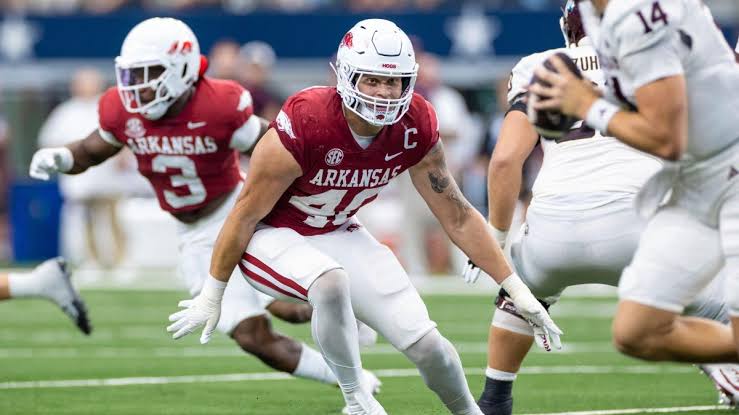
Arkansas Razorbacks: A Closer Look at Their QB Dilemma and Overall Play
The Arkansas Razorbacks have long been a team of rich tradition and passionate fan support. However, in recent years, they’ve struggled to establish a consistent and effective quarterback plan, which has ultimately affected their overall performance on the field. In this article, we will explore the factors contributing to their ranking among teams with the worst quarterback situations in college football, using a scale from 1 to 5.
1. Inconsistent Quarterback Play (Rating: 5)
At the heart of Arkansas’s struggles lies the inconsistency of their quarterbacks. The Razorbacks have cycled through multiple signal-callers over the last few seasons, struggling to find a reliable starter. This inconsistency hampers the team’s ability to build chemistry and develop a cohesive offensive strategy. The lack of a steady hand under center results in missed opportunities, stalled drives, and an inability to capitalize in critical moments.
The Impact of Injuries
Injuries have compounded this issue. The Razorbacks have seen their quarterbacks sidelined, forcing coaching staff to shuffle players and adapt their playbooks mid-season. Such disruptions not only affect the rhythm of the offense but also place immense pressure on the backup quarterbacks, who may not be prepared for the high-stakes environment of SEC play.
2. Recruitment Challenges (Rating: 4)
Recruitment plays a crucial role in shaping a college football program, and Arkansas has faced challenges in attracting top-tier quarterback talent. The SEC is a fiercely competitive landscape, and securing elite recruits can be difficult for teams outside of the traditional powerhouses. As a result, the Razorbacks have often settled for players who may not have been their first choice, leading to a lack of depth and skill at the position.
Evaluating Talent
Even when Arkansas has recruited quarterbacks, evaluating and developing talent has proven problematic. Coaches need to identify players who fit their system and can thrive in the pressure cooker of SEC football. Unfortunately, Arkansas’s recent history includes misses in quarterback evaluations, resulting in players who fail to develop into effective starters.
3. Offensive Scheme Limitations (Rating: 3)
Another significant factor contributing to the Razorbacks’ struggles is their offensive scheme. A modern, dynamic offense can make a significant difference in quarterback performance, and Arkansas has often been criticized for its conservative play-calling. Sticking to outdated or predictable schemes can stifle a quarterback’s ability to make plays and read defenses effectively.
The Need for Adaptation
In today’s game, adaptability is key. Opposing defenses study film rigorously, and teams that fail to innovate or adjust their offensive strategies can quickly become predictable. Arkansas’s inability to keep pace with the evolving nature of college football has hindered its quarterbacks, limiting their opportunities to showcase their skills and ultimately impacting the team’s overall success.
4. Supporting Cast and Development (Rating: 4)
A quarterback’s success is often dictated by the talent and development of the players around them. Arkansas has struggled to build a strong supporting cast, including offensive line stability and reliable wide receivers. Without a solid foundation, even the most talented quarterback can struggle to find success.
Offensive Line Issues
The offensive line has been a particular area of concern. A shaky line can lead to pressure and hurried throws, which exacerbates quarterback inconsistency. Furthermore, an ineffective run game can limit offensive options, forcing quarterbacks into predictable passing situations. When a quarterback lacks time to survey the field or faces constant pressure, their effectiveness diminishes significantly.
5. Coaching Stability (Rating: 2)
Finally, coaching stability—or lack thereof—has had a profound impact on the Razorbacks’ quarterback situation. Frequent changes in coaching staff can lead to a lack of continuity in both player development and offensive philosophy. When quarterbacks are forced to learn new systems and adapt to different coaching styles, it creates further challenges in their growth and performance.
The Importance of Continuity
Continuity is essential for quarterback development. When coaches establish a clear vision and commitment to developing their quarterbacks, it can yield positive results. However, the Razorbacks have struggled to maintain this continuity, resulting in players who may not fully grasp the offensive system or have the confidence needed to succeed.
Conclusion: A Path Forward
The Arkansas Razorbacks find themselves at a crossroads. With their current ranking among teams with the worst quarterback situations in college football, it’s clear that significant changes are needed to turn the program around. Addressing recruitment challenges, enhancing offensive schemes, and ensuring stability in coaching will be crucial for developing a successful quarterback plan.
As the Razorbacks look to the future, building a solid foundation—both on and off the field—will be key. The passionate fanbase deserves a competitive team that can contend in the SEC. With the right approach, Arkansas can emerge from its quarterback struggles and reclaim its place among the conference’s elite. The journey will be tough, but with dedication and strategic planning, the Razorbacks can transform their current situation into a success story.




